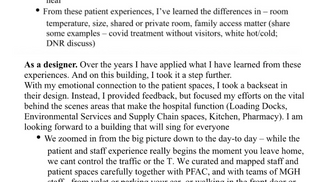Cancer as a Chronic Illness; Outreach, Drug Trials, Looking to the Future
- asrotman
- Apr 6, 2025
- 4 min read
Updated: Jul 26, 2025
Living with cancer in this day and age is much different than it used to be. Now, with new trials and treatments constantly in the works or on the horizon, people are living longer and getting access to more options to continue their fight with better quality of life. Pancreatic Neuroendocrine cancer is one of those “chronic illness” cancers and as I continue chemotherapy for my liver metastasis, I will post trial resources, my charity work, and things I learn to continue living life to the fullest throughout my care at DFCI, BWH, MGH, and NIH.
My Charity Outreach; Write-ups and Engagements:
There are so many people working passionately on the new Phillip and Susan Ragon Building that have been touched by cancer in some way. I was honored to tell my story about my personal connection to the project, and how my cancer journey impacts my design approach. Click Photo below for article access.
I was lucky to be selected as the Patient Speaker at the celebration for Philanthropist Herb Chambers’ milestone $100 Million Dollar building donor celebration event. Click Photo below for article access.
Click the images below for my speech and building renderings of the Herb Chambers Tower (phase one construction) and the completed building (the two towers of the Phillip and Susan Ragon Building, phase two complete)
General Cancer Awareness Drug Trials and Pancreatic Neuroendocrine Informatives:
(Previously LACNETS now renamed) Is my primary resource for one stop shopping. It includes podcasts, live and recorded presentations and discussions, support for patients and caregivers, clinical trials, education, and additional resources
(NIH National Cancer Institite Cancer Clinical Trials Database for clinical studies around the world)
As a secondary resource, I filter through this search engine for past, current, and upcoming drug trials to either inform my doctor of to look into further, research if they have been FDA or internationally approved as a standard of care (an option for treatment to consider), or to apply to for participation should I meet all the trial criteria (which honestly, has not happened yet for one exclusionary reason or another). Determining eligibility often involves discussing medical history, and sending relevant imaging results (CT scan, etc.), and biopsy results for genetic tumor information.
A presentation that directly relates to my current diagnosis of Stage 4 Pancreatic NET with Liver Metastasis. It includes a discussion of the evolving management of the disease progression.
Pancreatic Neuroendocrine Cancer is rare. Only seven in 100,000 people are diagnosed with a general Neuroendoctine Cancer per year in the United States, and it is often difficult to diagnose. Even fewer are diagnosed with Pancreatic, and even fewer with the aggressive, faster spreading level of Grade 3. This, of course, is me; less than one in 100,000, and only 4,200 cases diagnosed per year in the US. The cancer type is not to be confused with Pancreatic Cancer, which is still more aggressive yet. It involves hormones and endocrine cells, and thus can be impacted by stress and inflammation in the body. It’s origin is usually not known and it’s often tough to diagnose, the “why did this happen” a mystery. For me, I suspect the years of chronic pancreatitis from another pre-existing condition could be the irritating culprit.
The good news - yep I always find something - is that it is the popular cancer for clinical studies and trials at the moment. I have the buzz cancer! But personally researching trials and treatments can be daunting. The rarity and variability in how PNET behaves makes it challenging to develop a universally effective treatment. I have applied for and not met the complete criteria for two current trials. What’s more, what might work for some will not work for others. Chemotherapy and surgery had been the standard of care, but these have limited efficacy in the Grade 3 type in particular. Targeted therapies like PRRT (beta Lutathera lutetium Lu 77 Dotatate, alpha being trial tested now), immunotherapy, and other emerging therapies like histotripsy are being actively investigated and even FDA approved in order to improve treatment outcomes. Researchers are exploring various approaches, including combining targeted therapies with chemotherapy or immunotherapy, and clinical trials are playing a crucial role in identifying biomarkers that can help predict treatment response and monitor diseases progression. Hence, my team is treating my cancer like a chronic illness. I have a plan A, B, C…and we will just keep “kicking the can down the road” as much as we can, while we all do for all cancers, hope for a cure.
TargetCancer Foundation (Target Rare Cancer Knowledge) Study
This is a clinical, knowledge-based trial for rare cancers. It is a “decentralized, patient advocacy-initiated trial that aims to establish whether patients with rare tumors and cancer of unknown primary can benefit from matched molecular therapies” dictated by genomic testing on their tumor. It is a non-randomized, fully remote study that is a unique example of a national home-run clinical trial for precision genomics in rare cancers. It utilizes a virtual tumor board of experts so patients don’t spend their time traveling hospital to hospital in search of rare cancer experts, and helps recommend best course of treatment to the patients primary care team that they can choose to use, or not. I think this is incredible and couldn’t wait to give my consent and medical history access to participate. I eagerly await the results. My personal goal is to always have a plan A, B, C…and I hope this helps me to achieve that.


























Comments